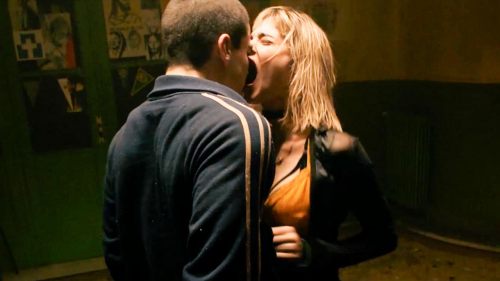Cannes 2019 Review: LUX ÆTERNA Reveals The Eternal Darkness Of Cinema Made By Men
Cinema is the eternal light in Gaspar Noé’s Lux Æterna, a short, experimental feature that immerses us in the behind-the-scenes drama of a fictional movie shoot. Realised in documentary style, it’s a chaotic account of filmmaking that jumps between the cinematic past (with intertitles citing canonical directors), the present (on a Béatrice Dalle-directed feature about witches), and the future. Shot in super widescreen to accommodate a diptych split screen, it has a social media, even virtual reality-esque aesthetic that shows different scenes and angles together in unnerving parallel. Lux Æterna is a story about how cinema has always been, and always will be, so long as there are cameras, screens, and audiences.
But Noé’s films famously demand more than casual observation, and there’s another tale being told here – and it is debatable whether is his to tell. From the opening dialogue between director Béatrice and lead actress Charlotte (Gainsbourg, with real names ramping up the realism), to the rabid strobe-effected baying of the male crew members at the end, the film shows men enacting violence against women on set. However, while it is likely well intentioned and taking tongue-in-cheek aim at the male egos dominating the film festival circuit—it premiered at, and also made numerous references to, Cannes—Noé’s shots fall wide of their mark.
Béatrice and Charlotte first discuss their previous experience making movies. Béatrice had to get naked to play a witch and had men looking at her body from all angles. It was awful being told to play sexy while clinging to rocks with no clothes on, she acknowledges. Charlotte recounts how a filmmaker once ejaculated over her leg without consent. Never mind, the women jest. They were making great art and the films were worth it.
As women filmmakers they, of course, are not seen as artists. As the split screen frenetically whips us between multiple meetings, stages, and languages, Béatrice, Charlotte, and her co-star Clara 3000 are undermined over and over again. The new director of photography takes exception to receiving instructions from a woman and disrupts every one of Dalle’s demands. An exec promises to dig up dirt and have her fired. Charlotte and Clara are stripped, spied on by photographers, followed, and harassed. A phone call from Charlotte’s young daughter suggests she has been abused by boys at school. Yet no one pays attention to Charlotte’s fear and she is ritually burned at the stake without any sympathy from the crew.
Noé’s film becomes more frantic as the set descends into chaos. It’s a visual and aural mess, with shouting, screaming, and crying emanating from all directions. Dalle spirals into a paranoid maze of corridors as she clutches at her head and wails. Meanwhile, intertitles announcing cool, if sinister, filmmaking wisdom from the likes of ‘Carl T’ and ‘Rainer W’ (discussing turning into a dictator on set) are juxtaposed with the carnage of uncontained emotion as the women lose control of the shoot.
On the surface, it seems that Lux Æterna is critiquing the misogyny of men in the film industry – and the intervention is welcome. However, the film is more a trigger than a bang. While the casual use of the male directors’ first names subverts our tendency to canonise great white men known only by their surnames (think Loach, Malick, Tarantino), their statements about control serve only to undermine the chaotic women. Noé is trying to play it both ways, looking with a male gaze at women filmmakers while simultaneously attempting to document the experience of women on the receiving end of that look.
There are some genuinely funny moments, though, with industry stock characters that women everywhere will recognise in the first-time filmmaker who thinks he can advance an established actress’s career, and the male journalist representing a ‘feminist’ festival. The social-media-esque visuals are also intriguing, and comment, perhaps, on how the once concealed spaces of the murky proto-filmic world have been exposed in an all-seeing age. But the problem with Lux Æterna is that it fails to fully see or hear women as real people. The closing sequence documents a freefall into a new circle of hell in which Dalle fails to release the tied-up actresses amid a power outage and mob of enraged men. A stroke-inducing flicker of red, green, blue, red, green, blue, red, green, blue blisters the screen and the eyes of the auditorium in a sensory cinematic assault on viewers. Stuck in a relentless filmic underworld that champions manic male behaviour and alleges women’s incapability, Lux Æterna represents a dark, nightmare future no less dreadful than that of cinema’s past.



